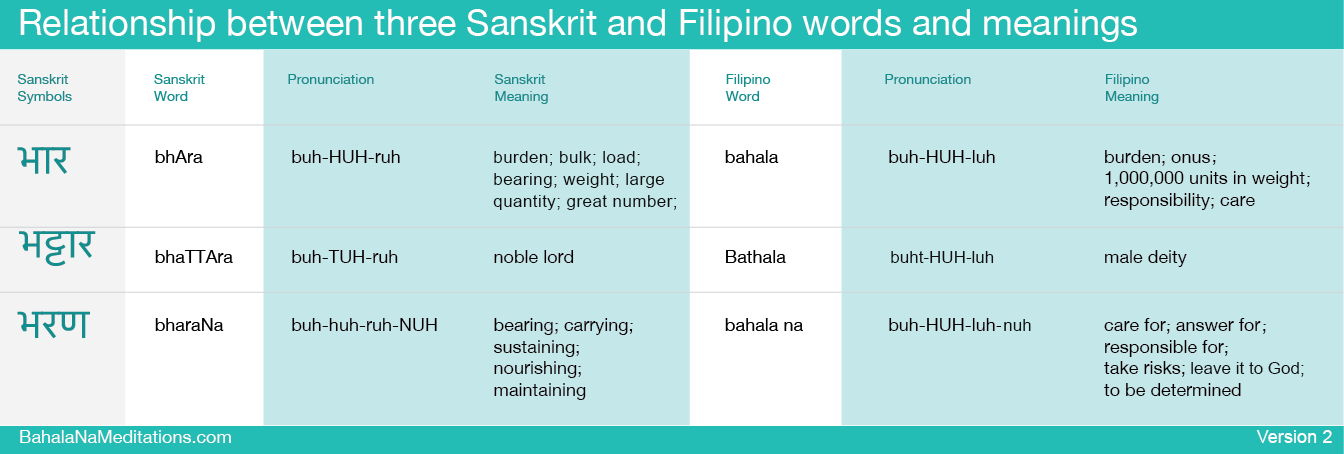Sanskrit origins of Bathala and Bahala
Etymology
There are many people who believe the phrase originates from the Tagalog word ”Bathala”, which means “god.”
It’s easy to see and hear why this would be so as the spelling and sound of the two words are very similar, differentiated by the use of the letter and sound of “t” in the word for “god.” But in fact, the word ”bathala” comes from the Sanskrit word of bhattara, which means “noble lord.”
And ”bahala” is a Tagalog word that actually means ”burden”, ”responsibility” or ”100 million units of weight”, and comes from the Sanskrit word ”[[bhara]]” and Malaysian word ”[[bahara]]”, which both mean ”burden”, ”weight”, or ”charge”.
”BharaNa” is also a Sanskrit and Hindi word that may have etymological pertinence. In Sanskrit, the word ”bharaNa” means ”sustenance”; it also means ”bearing”, as in ”carrying a burden or weight” or ”supporting”, ”nourishing”, and ”maintaining” as in ”caring for something”.
And then, in Hindi, the word ”bharana” means to ”complete”, as in a form or task; in Hindi, it also means to ”fill” as in ”filling a space or container”.
The meanings of ”bharaNa” to carry and support, ”bhara” and ”bahala” which both mean ”burden”, and ”bahala na” which means ”to be responsible for” are evidently related.
So there is a possibility that the oral tradition of saying “bahala na” may have directly originated from the Sanskrit/Hindi word of “bharaNa” in meaning and sound. When the Philippine’s pre-historic oral traditions and practices were being recorded in chronicles, papers and books, it was with their colonizers’ Western alphabet system, starting in the 15th century with the Spanish, and later in the 19th and 20th centuries with the United States. It’s a possibility that the phrase of ”bahala na” was always pronounced ”bahalana” from ”bharaNa” but was spelled out in the Western alphabet to be two distinct, and Filipino words, i.e. ”bahala” and ”na”. Of course, the direct relation between the Sanskrit ”bharaNa” and the Philippine ”bahala na” is currently speculation and theory at this point, as there are no found recorded etymological connections or citations of such a relationship.
References
Tagalog Borrowings and Cognates, by Jean-Paul G. Potet
SpokenSanskrit dictionary on “bharaNa”
English translation of ‘भरना’ bharana
Sanskrit words in the Philippines
~~~
More on Bathala
Bathala is an ancient Philippine word that signifies a Supreme God or Supreme Divine Being.
Bathala (Philippines), Bhatara (Java/Indonesia) and Shiva are all high ranking deities who are part of divine trinities.
In Philippine mythology, there were three powerful gods who lived in the universe—Bathala was the caretaker of the earth, Ulilang Kaluluwa (Orphaned Spirit), a giant serpent who lived in the sky, and Galang Kaluluwa (Wandering spirit), the winged, traveling god. Bathala was a rival of Ulilang Kaluluwa and good friend of Galang Kaluluwa. Bathala outlives both of these deities and then creates the race of humanity. In the Philippines Bathala is most commonly used to indicate a male deity, but it has also rare instances of being used to indicate a female deity.
Indonesian and Sanskrit Deities
Bathala as a name for a high-ranking deity has migrated through its neighboring countries coming from faraway India. The Sanskrit word of “bhattara” actually means “noble lord”!
In Indonesian mythology, a trinity of gods, Debata na Tolu, and includes Debata Bhatara Guru and his brothers Debata Sori Pada and Debata Mangala Bulan. These three gods rule the divine realm of Banua Ginjang.
(It is very interesting to note that the Indonesian word of “debata” is related to the Philippine word of “diwata” and the Sanskrit word of “devata“—all these words indicate deities or spirits within their geo-cultural areas of use and indicate varying ranks and powers in varying realms.)
In Java, Bhatara Guru is also known as Shiva “the lord of heaven.”
Within the texts of the Ramayana, an ancient Indian epic, Shiva is the highest ranking god and Brahma and Vishnu were his sons. Brahma is the creator, Vishnu the Preserver and Shiva the destroyer—these three gods formed the trimurti, the senior gods in the Hindu pantheon.

